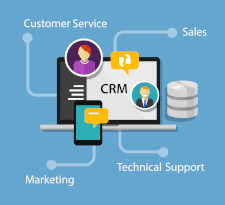CRM
Stands for Customer Relationship Management.
CRM refers to strategies, technologies, and practices businesses use to manage customer interactions and data. The goal is to enhance customer relationships, increase customer retention, and drive sales growth.
In the current digital age, establishing and maintaining meaningful customer relationships can be difficult. This is especially true in e-commerce, where personal interactions are limited. CRM systems play a pivotal role in enhancing customer relationships through personalized communication and exceptional customer service.
Customer Relationship Management solutions integrate various functions, such as sales, marketing, customer service, and support. By leveraging data analytics, businesses can gain valuable insights into customer behavior, preferences, and needs. These insights enable them to tailor their offerings and interactions to individual customers and clients.
While analytics are helpful, effective CRM requires understanding and anticipating customers' needs. Even the most advanced tools can't replace genuine customer service.
 Test Your Knowledge
Test Your Knowledge